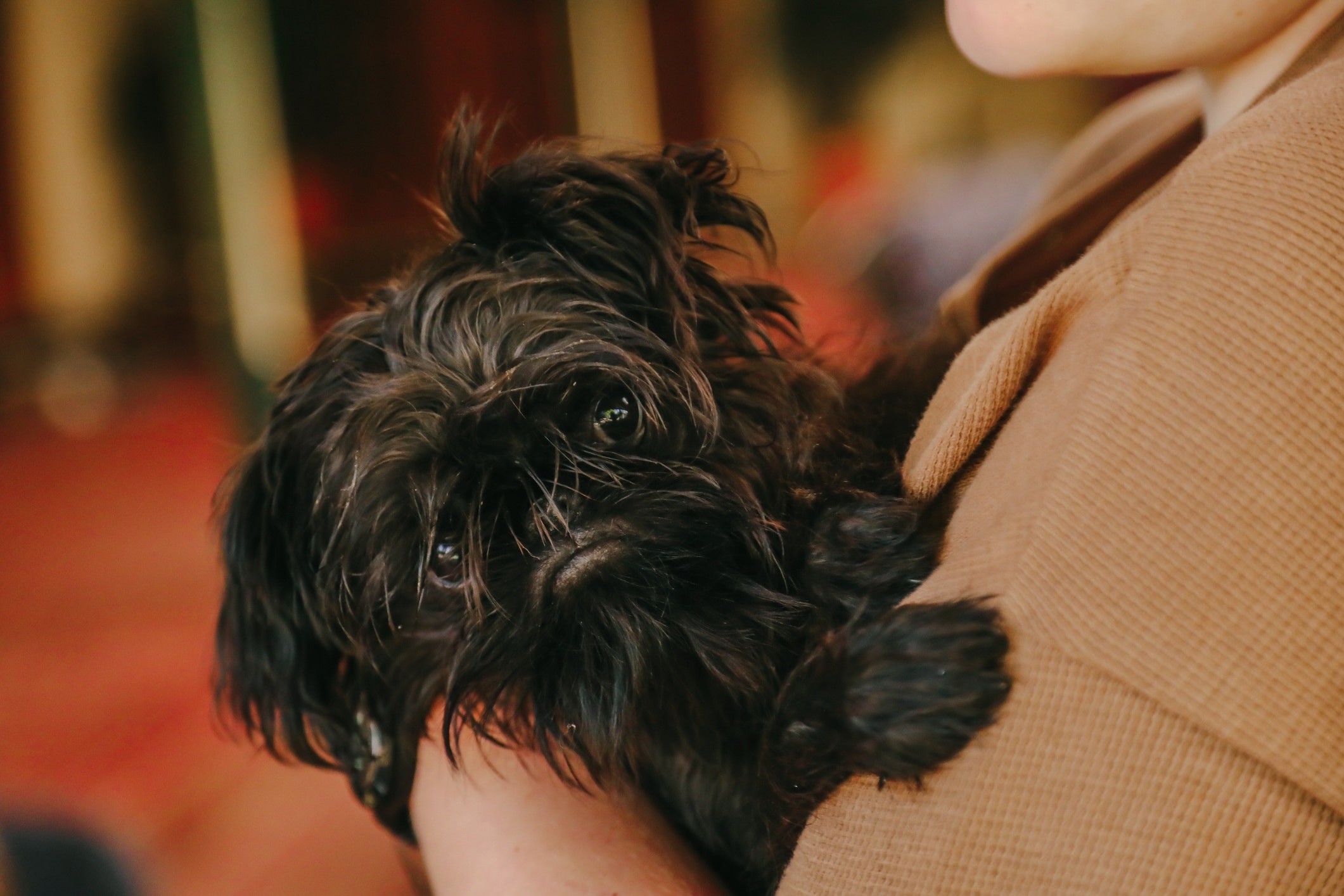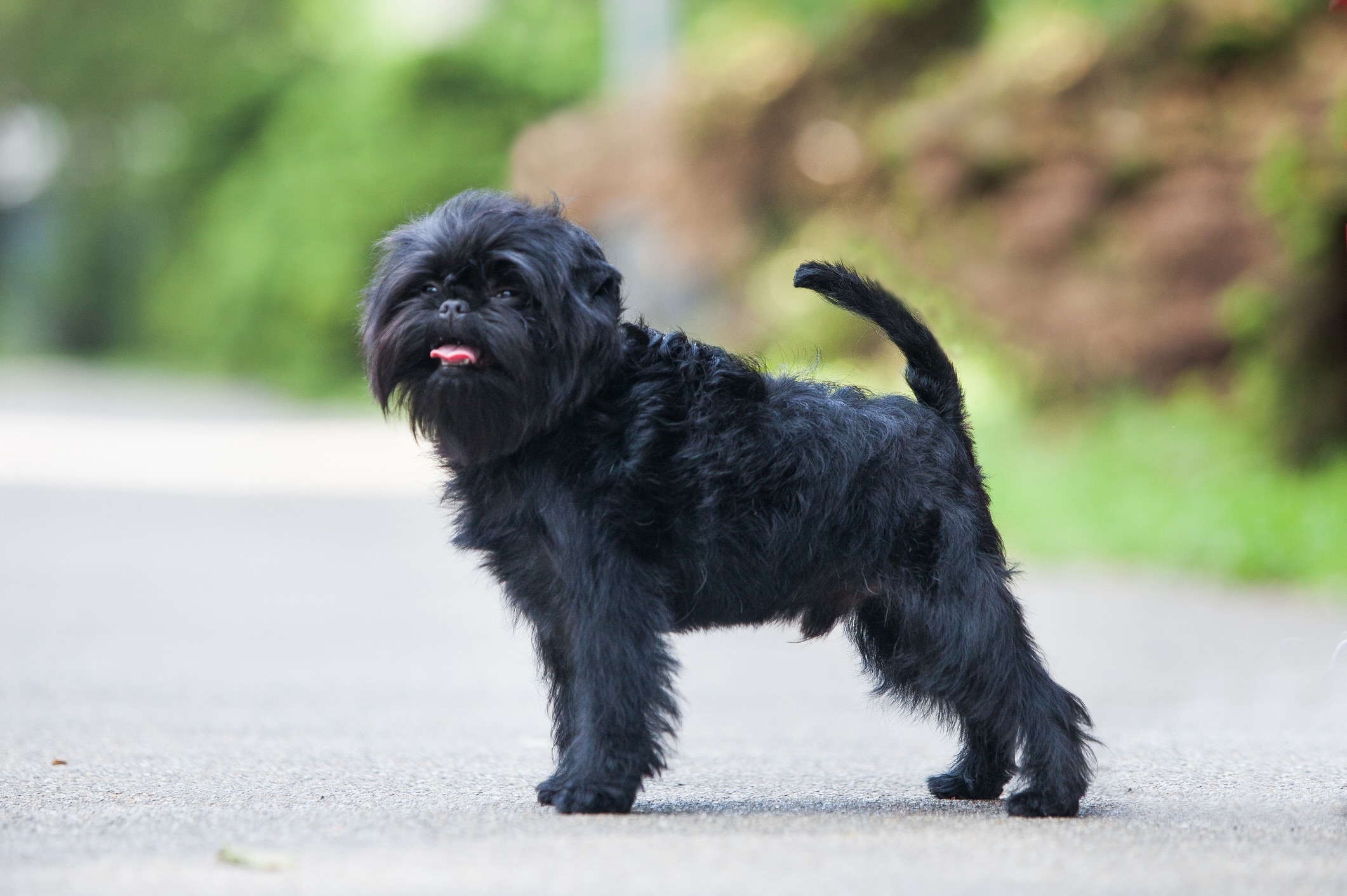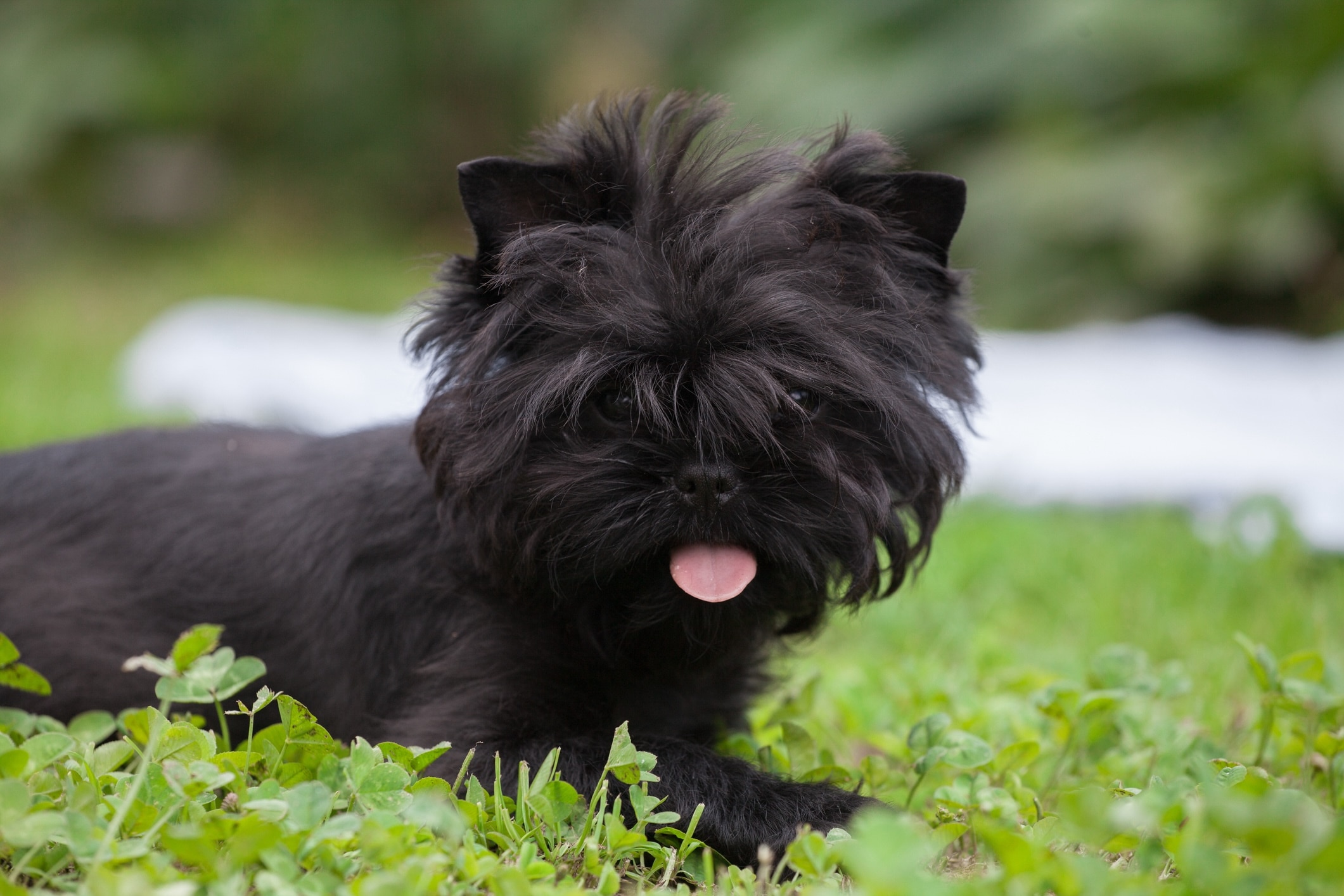Affenpinscher
Ilona Didkovska/iStock / Getty Images Plus via Getty Images
The Affenpinscher is a rare small-dog breed known for having a spirited, terrier-like personality and an almost monkey-like face that gives them the nickname The Monkey Dog.
Originating in 17th-century Germany, the breed was initially developed to hunt rats in homes, stables, and shops, according to the Affenpinscher Club of America (ACA). But over time, the Affenpinscher transitioned from a working dog to a beloved companion.
Physically, Affenpinschers are compact dogs that stand 9–12 inches tall and weigh 7–10 pounds. They have a scruffy coat that can be black, gray, silver, or red. Affenpinscher dogs are best known for their expressive face, with a short muzzle and dark, round eyes that give them an appearance not unlike a monkey.
The Affenpinscher personality is just as quirky as their looks—the dogs are bold, confident, and animated. Matthew Mullin, director of the Affenpinscher Club of America, described the breed as "a big dog in a little package."
Caring for an Affenpinscher
Affenpinschers are lively and affectionate dogs that can make a good pet for first-time dog parents. They have a moderate energy level and enjoy playtime and short walks, but they’re also happy to relax at home.
Known for their confident and curious nature, they can be somewhat independent, which may require patience during training. The best approach is to use positive reinforcement training methods and to keep sessions short and fun, like a game.
The Affenpinscher’s coarse and wiry coat requires regular brushing to prevent matting, and professional grooming is recommended every few months.
Affenpinscher Health Issues

Affenpinschers are generally healthy dogs with no significant predisposed health issues, Mullin says. The average Affenpinscher lifespan is 12–15 years, and while most live long and active lives, it’s important for pet parents to be aware of a few conditions their dogs can develop.
Reputable Affenpinscher breeders will have their dogs’ hips, eyes, and heart tested to ensure their puppies are healthy.
Brachycephalic Airway Syndrome
As flat-faced dogs, Affenpinschers can be affected by brachycephalic airway syndrome. This condition is caused by the anatomy of short-snouted dogs, affecting their breathing. Symptoms include:
-
Noisy breathing
-
Exercise intolerance
Brachycephalic dogs like the Affenpinscher need a few special care considerations. For example, these dogs do not do well in hot weather, so exercise during hot temperatures needs to be restricted. Obesity can also worsen the symptoms of brachycephalic airway syndrome, so it’s important to keep your dog at a healthy weight.
Severely affected dogs may require surgery to make breathing easier.
Patellar Luxation
Patellar luxation is a common condition in small dogs. This condition occurs when the kneecap dislocates from its normal position, leading to discomfort and trouble walking.
Mild cases may not require much intervention, but more severe cases could need surgery. Pet parents should keep an eye on their dog’s mobility and consult a vet to address signs of discomfort or instability: a limp that comes and goes, a bowlegged stance, and a cracking sound that comes from the knee.
Hip Dysplasia
Hip dysplasia, though more common in larger dogs, can still affect the little Affenpinscher. It occurs when the hip joint doesn’t form properly, leading to pain and arthritis.
Treatment can range from weight management and physical therapy to more intensive options like surgery to correct the hip dysplasia. Regular exercise and maintaining a healthy weight are key in managing this condition.
Mitral Valve Disease (MVD)
Older Affenpinschers may develop heart problems like mitral valve disease (MVD). MVD affects the heart’s ability to pump blood effectively, leading to symptoms like coughing, difficulty breathing, and lethargy.
While MVD can’t be cured, it can be managed with medication and routine veterinary care to ensure a good quality of life.
Cataracts
As they age, Affenpinschers can develop cataracts, which cloud the lens of the eye and impair vision. Early detection through regular wellness exams is important, and surgery is the best option for restoring sight in advanced cases.
What To Feed an Affenpinscher
When choosing dog food for your Affenpinscher, pet parents should focus on high-quality, balanced nutrition tailored to the breed’s small size and specific health needs. Choosing food that meets Association of American Feed Control Officials (AAFCO) nutrition standards is a great way to ensure your dog gets the nutrients they need.
The dog food also needs to be formulated for your Affenpinscher’s life stage, as puppies, adults, and seniors all have different nutritional needs.
How To Feed an Affenpinscher
A consistent feeding routine is key. Adult dogs should be fed two small meals per day—once in the morning and once in the evening—to maintain energy levels and prevent overeating. Affenpinscher puppies need more frequent meals, typically three to four times daily, to support their growth and prevent hypoglycemia (low blood sugar).
Using slow-feeder bowls can help prevent fast eating and reduce the risk of digestive issues, while raised bowls may benefit older dogs with mobility concerns.
Meals should be evenly spaced throughout the day and, as the dog ages, adjustments to their diet and portions may be needed to match their activity levels and health. Regular vet checkups will help fine-tune their feeding routine.
How Much Should You Feed an Affenpinscher?
Feeding amounts for Affenpinschers vary based on factors such as age, weight, activity level, and overall health. The dog food packaging will give you portion recommendations, but working with your vet will give you the best guidance.
It's important to monitor your dog’s weight and adjust portion sizes accordingly, as overeating can lead to obesity and joint strain. Regular vet visits can help determine the best feeding amounts based on your Affenpinscher’s specific nutritional needs, ensuring they maintain a healthy weight and get the proper balance of nutrients.
Nutritional Tips for Affenpinschers
Healthy Affenpinscher dogs that eat an AAFCO-compliant food should receive all necessary nutrients, but adding supplements to their diet can have benefits.
-
Glucosamine and chondroitin are important for joint health, helping to maintain cartilage and improve mobility, which is crucial given their predisposition to joint issues.
-
Omega-3 fatty acids, found in fish oil, promote healthy skin and coat while providing anti-inflammatory benefits for heart health.
-
Probiotics enhance digestive health by balancing the gut microbiome and improving nutrient absorption.
-
A high-quality multivitamin can fill nutritional gaps, supporting immune function and energy levels.
-
Antioxidants like vitamins C and E combat oxidative stress and bolster immunity, particularly in older dogs.
Always talk to your vet before giving an Affenpinscher a supplement.
Behavior and Training Tips for Affenpinschers
Affenpinscher Personality and Temperament

Affenpinschers have a lively and affectionate temperament, characterized by their confident and curious nature. As a pet parent, you can expect them to be playful, charming, and sometimes a bit mischievous, making them entertaining companions.
They have a moderate energy level and enjoy playtime and short walks through the neighborhood, but they don’t need lots of high-intensity exercise. And because they’re smart dogs, Affenpinschers need mental stimulation so they don’t become bored.
Affenpinscher Behavior
Affenpinschers can be great family dogs for pet parents with children, but kids need to be taught how to interact with dogs appropriately. The Affenpinscher is so small that rowdy playtime with kids might cause an accidental injury, so make sure all dog-child interactions are supervised.
While they are generally not overly anxious or fearful, some Affenpinscher dogs may show anxiety in unfamiliar situations if not properly socialized. This breed tends to be vocal and barks frequently to alert you of changes in their environment, but excessive barking can be managed with training.
Affenpinscher Training
While Affenpinschers are clever dogs, they can also be independent-minded thanks to their rat-hunter origins. This means pet parents need patience during training sessions. Be consistent and use positive reinforcement methods, like treats and praise.
Early socialization is crucial for Affenpinscher puppies, as it is for all breeds. Begin exposing your pup to new situations and stimuli as soon as you bring them home. This will help them grow into confident companions.
Fun Activities for Affenpinschers
-
Fetch
-
Scent games
Affenpinscher Grooming Guide
Affenpinschers have a distinctive crisp, medium-textured, wiry coat that’s typically dense and may be harsh to the touch, Mullin says. They don’t shed much and are considered “hypoallergenic” dogs, though there’s no such thing as a 100% hypoallergenic pet. That said, Affenpinschers may be a good fit for some people with dog allergies.
The breed requires consistent grooming to stay healthy.
Skin Care
Affenpinschers generally do not have specific skin care needs beyond regular grooming. Their wiry coat can trap dirt and debris, so regular brushing helps keep the skin healthy by preventing matting, allowing air circulation, and distributing natural oils for healthy skin.
Coat Care
Brush your dog at least twice weekly to prevent matting. Professional grooming every four to six weeks is recommended to maintain the coat's shape and address stubborn mats, especially in areas like behind the ears.
Bathing should be done as needed, typically every few months, using a gentle dog shampoo. Following this grooming regimen will help keep an Affenpinscher’s coat healthy and clean.
Eye Care
Affenpinschers have prominent round eyes that can be prone to tear stains. Gently wiping the area around their eyes with a vet-recommended cleaner can help reduce tear stains and keep their face clean.
Monitor your dog’s eyes for any changes such as redness, abnormal discharge, or cloudiness. Talk to your veterinarian if you have any questions about your dog’s eyes.
Additionally, the long hair around their eyes can obstruct vision and even irritate their eyes. Regular grooming to trim interfering hair is essential.
Ear Care
Affenpinschers require regular ear care to prevent infections and maintain overall ear health. Their ears are typically floppy, which can trap moisture and debris, creating an environment conducive to ear infections.
Routine ear cleaning is essential; pet parents should check their dog's ears weekly for signs of dirt, wax buildup, or odor; this will help keep an Affenpinscher's ears healthy and free from infections.
Considerations for Pet Parents

Pet parents should be prepared to meet the needs of this breed before bringing an Affenpinscher puppy home. While these dogs don’t require hours of exercise, they still need daily walks, playtime, and mental stimulation.
Affenpinschers also require consistent grooming, including at-home brushing throughout the week and professional grooming appointments every month or so. Pet parents should be prepared for this commitment.
With dedicated pet parents, the Affenpinscher will thrive in a wide variety of living situations.
Affenpinscher FAQs
Is an Affenpinscher a good family dog?
Yes, an Affenpinscher can be a good family dog. But interactions between these small dogs and children should always be supervised to prevent accidental injury.
Do Affenpinschers bark a lot?
Yes, Affenpinschers are known to be quite vocal and may bark more than some other breeds. They often bark to alert their pet parents of changes in their environment, like a neighbor walking by outside.
Why is the Affenpinscher called the ‘Monkey Dog’?
The Affenpinscher is referred to as The Monkey Dog due to their unique facial features and playful demeanor, which resemble a monkey.
Affenpinscher vs. Brussels Griffon: What’s the difference?
The Affenpinscher and Brussels Griffon are both small toy breeds that look a lot alike. The breeds are even related, Mullin says, because Brussels Griffons were created by crossing Pugs with Affenpinschers. They are both small breeds with a wiry coat and flat face.
But there are noticeable differences between the breeds. Namely, Affenpinschers are typically a little larger than Griffons. Griffons can also be more colors than Affenpinschers, and they can have a short coat instead of the Affenpinscher’s always-wiry hair.
How much does an Affenpinscher cost?
The typical Affenpinscher price can be $2,500–$4,000, depending on several factors such as bloodline and breeder. You can also find dogs to adopt at Affenpinscher rescue organizations.
